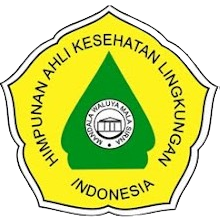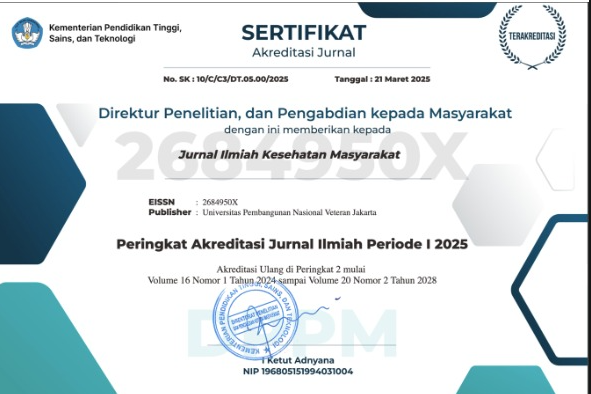Pencegahan Obesitas pada Remaja Melalui Intervensi Promosi Kesehatan: Studi Literatur
Abstract
Abstrak
Latar Belakang: Tingginya kejadian obesitas pada remaja masih menjadi tantangan kesehatan di dunia. Penyebabnya bersifat multifaktorial namun juga banyak disebabkan oleh perilaku hidup tidak sehat, sehingga diperlukan intervensi kesehatan untuk meningkatkan perilaku sehat agar mencegah obesitas sedini mungkin. Penelitian ini bertujuan untuk mengetahui faktor penyebab dan komplikasi yang obesitas pada remaja, serta menggambarkan upaya-upaya pencegahan yang data dilakukan.
Metode: Penelitian ini merupakan studi literatur dengan mengikuti prokotol PRISMA 2009. Pencarian artikel dilakukan melalui pustaka elektronik dengan menggunakan 3 database (Google Scholar, PubMed Central, dan Lancet). Kriteria inklusi yang ditetapkan ialah penelitian merupakan studi quasi-experimental dan terbitan 10 tahun. Kata kunci yang diguanakan ialah obesity”, “adolescent”, “prevention”, “health promotion”, dan “quasi.
Hasil: Hasil penelitian dari tinjauan artikel pada menggunakan kata kunci menemukan sebanyak 8.60 artikel, tetapi 7.059 artikel yang tidak sesuai dan masuk kedalam kriteria eksklusi. Kemudian dihasilkan jumlah akhir 6 artikel yang sesuai dengan kriteria inklusi dan terpilih untuk ditelaah.
Kesimpulan: Mencegah obesitas dilakukan melalui perilaku hidup sehat dengan menjaga pola makan dan meningkatkan aktivitas fisik. Perilaku tersebut memerlukan dukungan keluarga dan sekolah. Selain itu, terdapat beberapa alternatif pendukung diet simbang dan aktivitas fisik yang dapat diterapkan pada remaja meliputi: pendidikan kesehatan melalui pesan teks singkat dan booklet, dan video audio visual, pemantauan berat badan melalui aplikasi diet, bersepeda ke sekolah, pemanfaatan halaman sekolah, dan exergaming. Sehingga digharapkan keluarga dan pihak sekolah berperan aktif dalam memberikan edukasi kepada remaja.
Kata Kunci: Obesitas, Preventif, Promosi kesehatan, Remaja
Abstract
Background: The high incidence of obesity in adolescents is still a global health challenge. The causes are multifactorial but also many are caused by unhealthy living behavior, so that health interventions are needed to improve healthy behavior in order to prevent obesity as early as possible. This study aims to determine the causative factors and complications of obesity in adolescents, as well as to describe the prevention efforts that the data has carried out.
Methods: Electronic study literature using 3 databases (Google Scholar, PubMed Central, and Lancet) using a quasi-experimental design study found from the last 10 years by following the 2009 PRISMA protocol according to the inclusion and exclusion criteria.
Result: The results of the article review using the keywords "obesity", "adolescent", "prevention", "health promotion", and "quasi" a total of 7,059 articles that do not fit and fall into the exclusion criteria. Then a final number of 6 articles was produced that matched the inclusion criteria and was selected for review.
Conclusion: Based on this research, to prevent obesity is through healthy living behavior by maintaining a diet and increasing physical activity. This behavior requires support from family and school. In addition, there are several alternatives to support a balanced diet and physical activity that can be applied to adolescents including: health education through short text messages and booklets, and audio-visual videos, weight monitoring through diet applications, cycling to school, utilization of the school yard, and exergaming.
Keywords: Adolescent, Health promotion, Obesity, Prevention
References
Adriani M, Wirjatmadi B. Peranan Gizi dalam Siklus Kehidupan. Jakarta: Kencana Prenada Media Group; 2016. 326–332 hal.
Kumala M, Bardosono S. Masalah Gizi Ganda pada Remaja Usia 15-19 Tahun.pdf. Journal of the Indonesian Medical Association. 2014. hal. Volum 64, No.1.
WHO. Obesity and overweight. World Health Organization. 2021.
Kementrian Kesehatan RI Badan Penelitian dan Pengembangan. Riskesdas DKI Jakarta 2018. Laporan Provinsi DKI Jakarta. 2018. 1–535 hal.
Rossouw HA, Grant CC, Viljoen M. Overweight and obesity in children and adolescents: The South African problem. S Afr J Sci. Mei 2012;108(5/6).
Chung K-H, Chiou H-Y, Chen Y-H. Psychological and physiological correlates of childhood obesity in Taiwan. Sci Rep. Desember 2015;5(1):17439.
Surudarma IW. Obesitas pada anak. Buku ajar endokrinologi anak. Universitas Udayana; 2017.
Kementerian Kesehatan RI. Panduan Pelaksanaan Gerakan Nusantara Tekan Angka Obesitas (GENTAS). Http://P2Ptm.Kemkes.Go.Id/Dokumen-Ptm/Panduan-Gentas. 2017. hal. 6–16.
Gozali TO, Saraswati MR. Hubungan Obesitas Pada Orangtua Dengan Terjadinya Obesitas Pada Anak Remaja SMA Di Kota Denpasar, Provinsi Bali. J Penyakit Dalam Udayana. Juni 2017;1(1):22–9.
Sidiartha IGL, Juliantini NPL. Hubungan Riwayat Obesitas Pada Orangtua Dengan Kejadian Obesitas Pada Anak Sekolah Dasar. E-Jurnal Med Udayana. 2013;3(12):1–13.
M Etika N. Bagaimana Cara Otak Mengatur Nafsu Makan? Hello Sehat Kemenkes RI. 2021.
World Health Organization. Physical activity. World Health Organization. 2020.
Kurdanti W, Suryani I, Syamsiatun NH, Siwi LP, Adityanti MM, Mustikaningsih D, et al. Faktor-faktor yang mempengaruhi kejadian obesitas pada remaja. J Gizi Klik Indones. 2015;11(4):179–90.
Dhani SR, Yamasari Y. Rancang bangun sistem pakar untuk mendiagnosa penyakit degeneratif. J Manaj Inform. 2014;3(2):17–25.
Kementerian Kesehatan RI. Perilaku CERDIK: Masa Muda Sehat, Hari Tua Nikmat, Tanpa Penyakit Tidak Menular – Sehat Negeriku. Sehat Negeriku Kemkes RI. 2012.
Kementerian Kesehatan RI. Cegah dan Kendalikan Obesitas Dengan Gaya Hidup Sehat. p2ptm.kemkes.go.id. 2018.
Kurniawan F, Prabandari YS, Ismail D, Dewi FT. Efektivitas program sehat dalam mencegah obesitas pada murid sd di jakarta utara. [Yogyakarta]: Universitas Gadjah Mada; 2017.
Lanita, Surdargo, Huriyati. Pengaruh pendidikan kesehatan melalui short message service (sms) dan booklet tentang obesitas pada remaja overweight dan obesitas. J Gizi Klin Indones. 2015;12(1):36.
S R, Fitriani. Efektifitas Pendidikan Kesehatan dengan Penggunaan Media Audio Visual Video terhadap Perubahan Pengetahuan Remaja Tentang Obesitas di SMPN 1 Pekanbaru Tahun 2019. Prepotif J Kesehat Masy. 2019;3(2):5–24.
Puigdomenech E, Martin A, Lang A, Adorni F, Gomez SF, McKinstry B, et al. Promoting healthy teenage behaviour across three European countries through the use of a novel smartphone technology platform, PEGASO fit for future: Study protocol of a quasi-experimental, controlled, multi-Centre trial. BMC Med Inform Decis Mak. 2019;19(1):1–13.
Østergaard L, Støckel JT, Andersen LB. Effectiveness and implementation of interventions to increase commuter cycling to school: A quasi-experimental study. BMC Public Health. 2015;15(1):1–8.
Andersen HB, Pawlowski CS, Scheller HB, Troelsen J, Toftager M, Schipperijn J. Activating schoolyards: Study design of a quasi-experimental schoolyard intervention study. BMC Public Health. 2015;15(1).
Ye S, Pope ZC, Lee JE, Gao Z. Effects of school-based exergaming on urban children’s physical activity and cardiorespiratory fitness: A quasi-experimental study. Int J Environ Res Public Health. 2019;16(21):1–9.
National Health Services. Obesity - Causes - NHS. United Kingdom. 2019.
Julian V, Thivel D, Miguet M, Pereira B, Costes F, Coudeyre E, et al. Eccentric cycling is more efficient in reducing fat mass than concentric cycling in adolescents with obesity. Scand J Med Sci Sport. 2019;29(1):4–15.
Weihrauch-Blüher S, Kromeyer-Hauschild K, Graf C, Widhalm K, Korsten-Reck U, Jödicke B, et al. Current Guidelines for Obesity Prevention in Childhood and Adolescence. Obes Facts. 2018;11(3):263–76.
Witherspoon L. ACSM Information On Exergaming. Acsm. 2013;
Kemenkes RI. Profil Kesehatan Indonesia Tahun 2019. Vol. 42, Kementrian Kesehatan Repoblik Indonesia. 2019. 97–119 hal.
Pasco D. Impact of Exergaming on High School Students ’ Situational Motivation and Physical Activity Levels. 2015;(October):13–4.
Laato S, Hyrynsalmi S, Rauti S, Islam AKMN, Laine TH. Location-based games as exergames - from pokémon to the wizarding world. Int J Serious Games. 2020;7(1):79–95.









.jpg)








